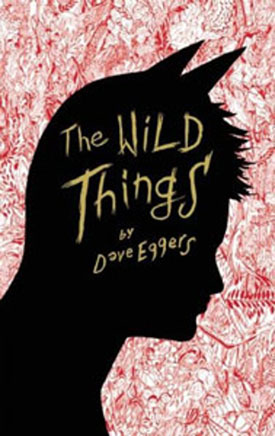 The Wild Things is Dave Eggers’ foray into the universe of Maurice Sendak, a novelization based on Sendak’s Where the Wild Things Are and Eggers’ own collaboration with Spike Jonze on the screenplay for the film of the same title. It’s a mixed bag.
The Wild Things is Dave Eggers’ foray into the universe of Maurice Sendak, a novelization based on Sendak’s Where the Wild Things Are and Eggers’ own collaboration with Spike Jonze on the screenplay for the film of the same title. It’s a mixed bag.
Eggers gives us a strong start, portraying Max’s environment and his emotional life vividly. Thinking back to my own childhood, I found myself wondering if I was really that amoral, that bloodthirsty, and that detached from reality. I suspect I may have been, traits I no doubt shared with eight-year-olds from time immemorial, although I doubt that I ever really wanted to kill my sister. (Although there were times. . . .) The strength of this section is that we really do see events and personalities filtered through Max’s perceptions, from Mrs. Mahoney, mother of his friend Clay who lives down the street, who won’t let him ride his bike the little distance back home alone and decides to jog along with him (he finally escapes her by riding into the woods at the end of the cul-de-sac), to the shattering news, passed along offhandedly by his teacher, that the sun will die someday, a bit of information that resonates among all Max’s childish fears and apprehensions with great power.
The book starts to lurch around a bit when Max makes his journey to the land of the Wild Things. The journey itself seems to want to partake of just about any shipwreck story you’ve ever read: Max runs away on a sailboat he finds at the shore of the bay, aiming to join his father in the city, but it seems the boat has a mind of its own. The journey is tedious and uncomfortable, and we are treated to the tedium and discomfort in detail, although somehow it never becomes real.
The Wild Things themselves are pungently drawn, and Eggers seems to have captured the feel of Sendak’s originals perfectly. However, Sendak’s story is fairly slight — it’s a children’s book, after all — and one gets the distinct sense of Eggers reaching to fill space: the weight of the events described begins to overtake the story.
The creatures can be read a couple of different ways, and I have to say that Eggers has done a wonderful job in portraying them as distinct individuals. Carol is the unspoken leader, large, powerful, and supremely jealous of Max’s attention. Katherine is warm and comforting, sometimes seductive, and seems to rescue Max from sticky situations as often as she gets him into them. Ira is afraid of the void, and compensates by trying to eat Judith, who is cynical, caustic, and yet basically very honest. Douglas is a follower, while Alexander simply doesn’t like Max. The Bull is large, ominous, and silent. Take them as aspects of a single personality, and you are probably on the right track. The bulk of the book is taken up with Max’s increasingly desperate attempts to maintain control of his subjects, which, if you’re so inclined, you could probably read as Max trying to maintain control of himself, of his own impulses and emotional swings. Since the Wild Things show no hesitation about eating anything and everything, one can quite legitimately lump it all together as “appetites.” (I might add that almost no one exhibits what can be called rational behavior here.)
However, even learning through Eggers’ own comments that this is probably the case, I still found myself wondering “why go through all this?” I’m not convinced that Sendak’s story provides adequate framework for the story that Eggers was trying to tell, and the whole effort struck me as pretty much overkill. The book comes out at just barely 285 pages. It could have been half as long to better effect.
(McSweeney’s Books, 2009)
